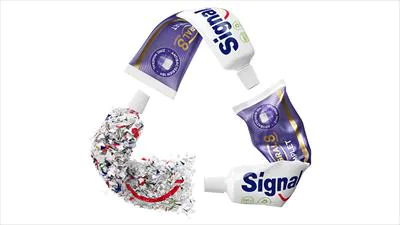Unilever is a London-based consumer goods company and an innovative sustainability leader.
After four years of collaboration across the global packaging industry and waste management organizations, Unilever recently announced the launch of recyclable toothpaste tubes in France and India. These countries represent two of Unilever’s largest markets for toothpaste but are just the tip of the iceberg, as the company plans to make all toothpaste tubes fully recyclable by 2025. The new tubes will be made of mostly High-Density Polyethylene (HDPE), one of the most commonly recycled plastics in circulation. The company’s design is a thin HDPE plastic, further reducing the amount of plastic used in each product. This is a shift from the nearly impossible-to-recycle plastic and aluminum-lined toothpaste tubes that have historically been the industry norm.
Toothpaste, while not a notable component of Unilever’s growth, is a stable revenue generator for the company as a consumer staple. Such consistent consumer use, however, inevitably leads to an equally consistent waste stream; one that has some waste management companies concerned given the lengthy biodegradation period of the product (Nature reports a 500 year period for toothpaste tubes to biodegrade). It is estimated that over 1.5 billion toothpaste tubes are disposed of globally every year.
Unilever’s focus on recyclable goods comes from its “commitment to ensure that 100% of its plastic packaging is designed to be reusable, recyclable or compostable” by 2025, according to its press release. The company also hopes to incorporate post-consumer recycled plastics into the product as early as 2022. An enabler in its industry, Unilever is taking the additional step of sharing the HDPE innovation with other companies, hoping to inspire an industry shift towards recyclable toothpaste tubes.

